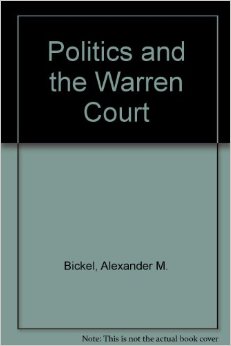Joanna Cotler Books, 1965.
“For all of the current attacks on the Supreme Court, no sensible critic would argue with the view that our Constitution and courts are basically sound. The crucial issue is whether their functions are to be circumscribed by notions of symmetry derived from the law’s inevitably conservative self-image, or whether they are meant to be flexible, creative instruments to achieve social conditions satisfactory not only to the judges but to the judged.
This issue runs through Politics and the Warren Court, a collection of pieces originally written for the New Republic and other journals which Mr. Bickel has now published in substantially recast form. No one seriously interested in American politics should hesitate to read this book for fear that it is mere journalism or, worse, mere law. It is better than both. The first half, which analyzes various constitutional problems raised by the diversity of civil-rights activity, is the most literate discussion of the political tensions provoked by the civil-rights movement that has yet appeared. Its survey of the school desegregation cases following Brown v. Board of Education describes with deadly accuracy how the federal courts in the South accommodated the resistance to integration. Similarly, Mr. Bickel’s discussions of the Kennedy civil-rights record, the strategy of civil disobedience, the 1964 Civil Rights Act, and the 1965 Voting Rights Act—which is tied together by his inquiry into the relative effectiveness of legal action by the courts and the executive branch—provide an enormously informative and provocative analysis of the relevant issues. The second half of Politics and the Warren Court, from which the book more directly draws its title, consists of an analysis of the Supreme Court’s generally liberal rulings since 1953 in the areas of reapportionment, religious practices in public schools, and public funds in parochial schools.”
–Melvin L. Wulf, Commentary (April 1, 1966)
Online:
Amazon
Google Books

